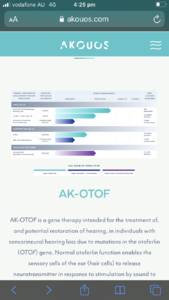The first participant to receive AK-OTOF in the study, an 11-year-old at the time of AK-OTOF administration with profound hearing loss from birth, experienced restored hearing within 30 days of AK-OTOF administration. In this individual, hearing was restored across all tested frequencies, achieving thresholds of 65 to 20 dB HL, and within the normal hearing range at some frequencies at the Day 30 visit. Both the surgical administration procedure and the investigational therapy were well tolerated, and no serious adverse events were reported.
"Gene therapy for hearing loss is something physicians and scientists around the world have been working toward for over 20 years," said Professor John Germiller, M.D., Ph.D., attending surgeon and Director of Clinical Research in the Division of Otolaryngology at Children's Hospital of Philadelphia, and a principal investigator of the AK-OTOF-101 Clinical Trial who administered AK-OTOF to this participant. "These initial results show that it may restore hearing better than many thought possible."
In the AK-OTOF-101 trial, eligible participants receive a single, unilateral intracochlear administration of AK-OTOF, with hearing restoration assessed by behavioral audiometry and auditory brainstem response (ABR), a clinically accepted and objective measure of hearing sensitivity. Participants in cohort 1 receive AK-OTOF at a dose of 4.1E11 total vector genomes.
"Children with OTOF-mediated hearing loss are often born with profound hearing loss, yet only a small fraction have undergone genetic testing to receive a definitive diagnosis," said Dr. Oliver Haag, pediatric otolaryngologist, Head of Otolaryngology at Sant Joan de Deu Hospital in Barcelona, and an investigator in Akouos's AK-OTOF-NHS-002 Natural History Study in which the first individual to receive AK-OTOF was participating. "The AK-OTOF-101 Clinical Trial and AK-OTOF-NHS-002 Natural History Study demonstrate the power of international collaboration in the development of new medicines for rare genetic conditions. It is gratifying to see this collaborative effort provide benefit to the first participant to receive AK-OTOF."
Hearing loss is the most common sensory condition, and with no approved pharmacologic treatments to restore hearing, represents a significant area of unmet need in medicine. Millions of individuals worldwide have disabling hearing loss because one of their genes generates an incorrect or incomplete version of a protein the ear requires for hearing. In many of these cases – including for some of the estimated 200,000 individuals worldwide who live with OTOF-mediated hearing loss – delivering a healthy version of the gene to a target cell within the inner ear has the potential to restore auditory function and enable high-acuity physiologic hearing. OTOF-mediated hearing loss is the first monogenic form of hearing loss to be investigated as part of a gene therapy clinical trial.
"We are grateful to the participants, their families, the investigators and other collaborators who are working together with us on this pioneering trial," said Emmanuel Simons, Ph.D., M.B.A., CEO of Akouos and SVP, Gene Therapy at Lilly. "These initial results highlight the potential impact genetic medicines could have on individuals with OTOF-mediated hearing loss and reinforce our mission to make healthy hearing available to all."
AK-OTOF has been granted Orphan Drug Designation and Rare Pediatric Disease Designation by the FDA and has received a positive opinion on orphan drug designation by the EMA Committee for Orphan Medicinal Products.

 Manager
Manager You are on fire lately!
You are on fire lately!  Keep them coming!
Keep them coming! 
 Member
Member

